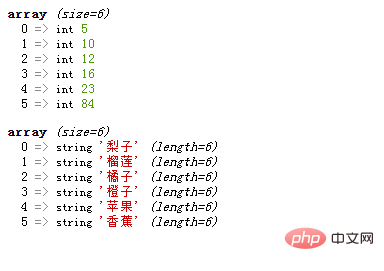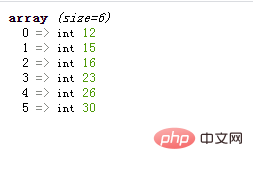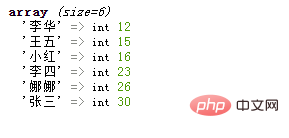
Array sorting is a common operation in arrays (another common operation is looping, which was introduced in the previous article. If you are interested, you can check out "PHP Loop Learning 4: How to use the foreach statement to traverse and modify an array Element》), which sorts the elements inside the array, can manage data effectively and reasonably, and improve the execution efficiency of the program.
Today we will take a look at the ascending operation in array sorting, introduce several array functions that can be sorted in ascending order, and use code examples to show how these array sorting functions perform ascending sorting. (Attachment:PHP function array array function video explanation)
There are three commonly used ascending array sorting functions in PHP:
sort() : Sort the array elements in ascending order
asort(): Sort the array in ascending order according to the key value of the associated array
ksort() : Sort the array in ascending order according to the key name of the associated array
1. Use the sort() function
sort() function to sort the array The elements are sorted in ascending order (small to large, low to high).
Output:

Output result:sort() function has two parameters: $array (required) and $sortingtype (can be omitted ).
Among them, the $sortingtype parameter is used to define the function sorting mode and specify how to compare the elements/items of the array. The default value is "SORT_REGULAR".
The $sortingtype parameter can be set to the following values:
0 = SORT_REGULAR: Compare array elements normally without changing their type (default value);
1 = SORT_NUMERIC: Treat array elements as numbers;
- ##2 = SORT_STRING: Treat array elements as strings;
- 3 = SORT_LOCALE_STRING: Compare array elements as strings based on the current locale (can be changed via setlocale()).
- 4 = SORT_NATURAL: Similar to natsort(), it sorts strings in "natural order" for each array element. It is new in PHP5.4.0.
- 5 = SORT_FLAG_CASE: Can be combined with SORT_STRING or SORT_NATURAL (OR bitwise operation), case-insensitive sorting string.
Copy after login
30,"李四"=>23,"王五"=>15,"李华"=>12,"娜娜"=>26,"小红"=>16); sort($age); var_dump($age); ?>

2. Use the asort() function
The asort() function will sort the associative array in ascending order based on the key values and will not modify the key names in the original array. .header("Content-type:text/html;charset=utf-8"); $age = array("张三"=>30,"李四"=>23,"王五"=>15,"李华"=>12,"娜娜"=>26,"小红"=>16); asort($age); var_dump($age); ?>

asort() function also has two parameters, the parameter values are the same as the sort() function, you can refer to.
3. Use the ksort() function
The ksort() function will sort the associated array in ascending order according to the key name, and will not modify the original array. key name.30,"李四"=>23,"王五"=>15,"李华"=>12,"娜娜"=>26,"小红"=>16); ksort($age); var_dump($age); ?>
##
"lemon", "o"=>"orange", "b"=>"banana", "a"=>"apple"); ksort($arr); var_dump($arr); ?>
 Output:
Output:

Recommended:《
PHP interview questions summary (collection)》《php video tutorial》
The above is the detailed content of Tips for learning PHP arrays: Use array functions to sort arrays in ascending order!. For more information, please follow other related articles on the PHP Chinese website!




